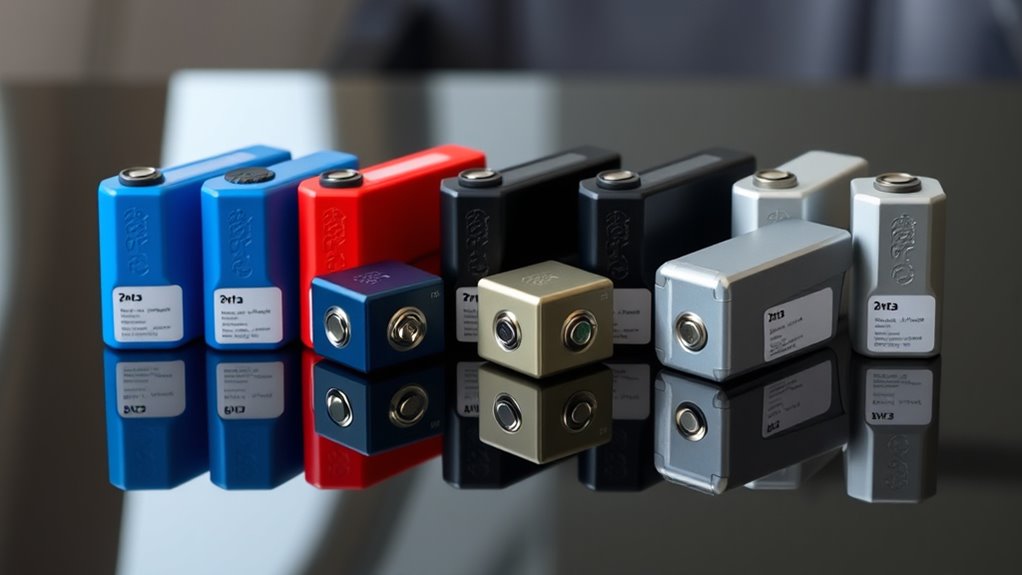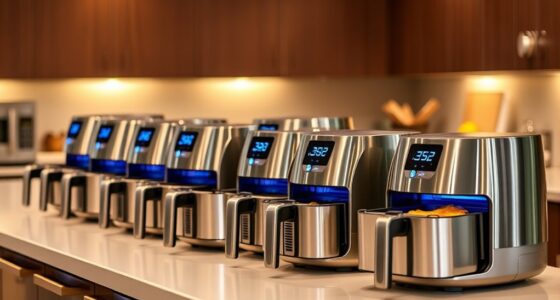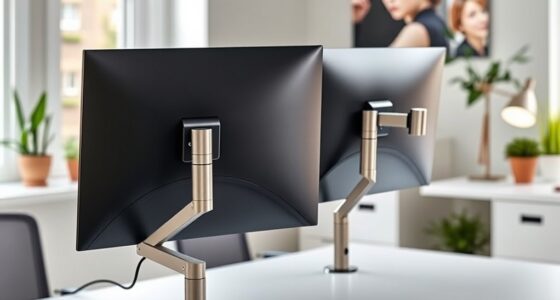If you’re looking for reliable airline-approved battery packs for medical devices in 2025, I recommend checking out options like the Freedom CPAP Battery Backup, EASYLONGER ES960, and Zopec Explore Mini, all offering safety, portability, and long-lasting power. Models like the BLUETTI X30 are perfect for emergencies, while TSA-approved units like the Krisdonia help meet travel regs comfortably. To find the best fit for your needs, stay with me as I explore these top choices and what makes them trustworthy.
Key Takeaways
- Choose batteries with FAA/TSA approval, capacity under 160Wh, and proper labeling for seamless airline security compliance.
- Prioritize models with safety certifications (UL, CE, IEC) and built-in protections against overcharge, over-discharge, and thermal hazards.
- Opt for lightweight, compact designs like EASYLONGER ES270 or Zopec Explore Mini for easy travel and extended device use.
- Ensure batteries support multiple charging options, including AC, USB-C PD, and optional solar panels, for flexible recharging.
- Select models with at least a one-year warranty, reliable customer support, and proven safety standards for trusted long-term use.
Freedom CPAP Battery Backup Power Supply
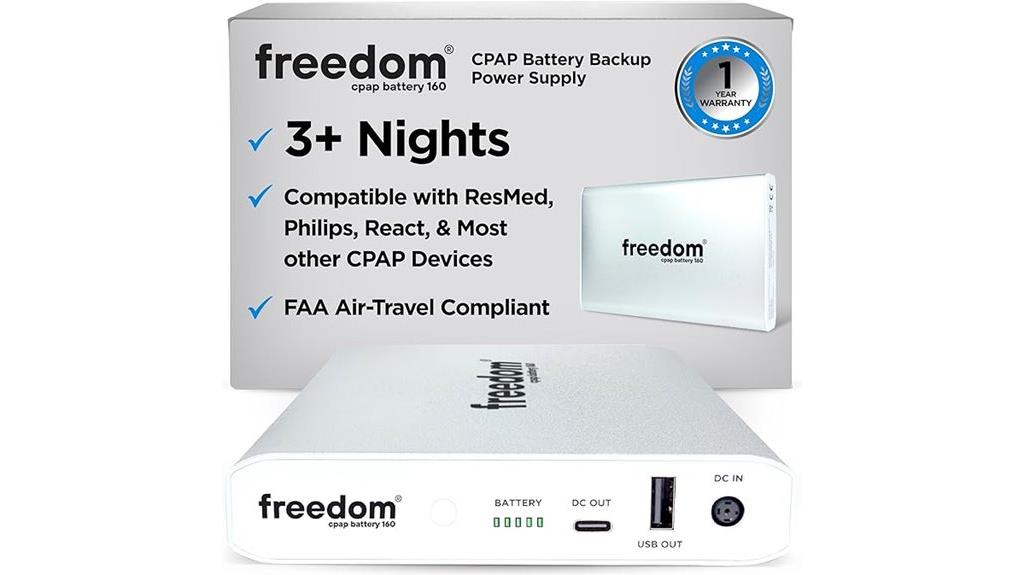
If you’re looking for a reliable power backup for your CPAP machine while traveling, the Freedom CPAP Battery Backup Power Supply is an excellent choice. It features a 160 Watt Hour lithium-ion battery, making it ideal for portable use during trips, camping, or power outages. Its rechargeable design guarantees you always have dependable power when standard outlets aren’t available. Compatible with popular models like ResMed AirSense and Philips DreamStation, it provides flexible runtime, especially when heating functions are disabled. Compact and lightweight at just 3.7 pounds, it includes an LED indicator and AC charger. Plus, it comes with a 1-year warranty and support, giving you peace of mind.
Best For: travelers, campers, and individuals experiencing power outages who need a reliable portable backup power source for their CPAP machine.
Pros:
- Compact and lightweight design (7.9 x 5.1 x 1.0 inches, 3.7 pounds) for easy portability
- Compatible with popular CPAP models like ResMed and Philips DreamStation, including models requiring a 14V cable (sold separately)
- Rechargeable lithium-ion battery with a 160 Watt Hour capacity provides flexible runtime, especially when heating functions are disabled
Cons:
- Some CPAP models may require additional accessories such as a 14V output cable (sold separately)
- Run time varies depending on device settings and use of humidifiers or heated tubing
- Airline carry-on policies should be verified before travel to ensure compliance
EASYLONGER CPAP Battery Backup Power Supply (ES960)

The EASYLONGER CPAP Battery Backup Power Supply (ES960) stands out as the top choice for travelers and medical professionals who need reliable, airline-approved power on the go. With a 297.6Wh capacity, it can power most CPAP models for over two nights, even with humidifiers off. It features multiple connection options, including DC cables compatible with popular devices, and supports both AC and USB recharging, plus solar panels. Built with LiFePO4 cells, it guarantees safe, long-lasting performance, with around 3000 recharge cycles. Its portability and versatility make it ideal for camping, emergencies, and off-grid use, giving users peace of mind wherever they are.
Best For: travelers, medical professionals, and outdoor enthusiasts seeking reliable, airline-approved backup power for CPAP devices and other portable electronics.
Pros:
- High-capacity 297.6Wh battery supports over two nights of CPAP use with humidifier off
- Multiple connection options including DC, AC, USB, and wireless charging for versatile device compatibility
- Built with LiFePO4 cells ensuring safety, long cycle life (around 3000 recharge cycles), and thermal stability
Cons:
- Recharging via solar panel requires additional purchase of compatible 100W+ solar panels (not included)
- Uses separate DC cables for certain models, which may be an extra step for setup
- Slightly heavy and bulky for ultra-light travel, despite its portability
Backup Power Supply & Travel Battery (2nd Gen) with Swappable 150Wh Cell Pack
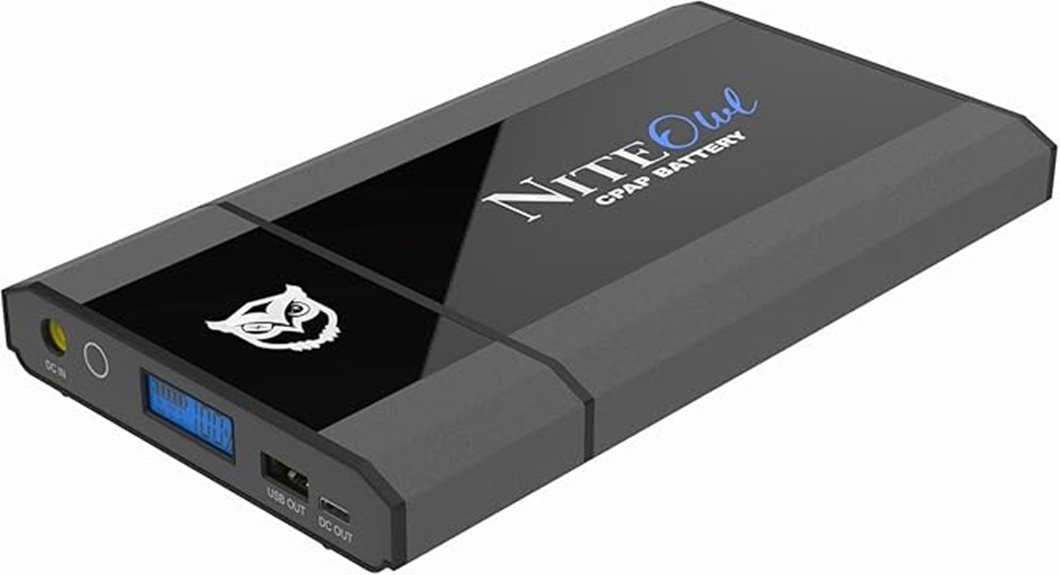
Travelers and outdoor enthusiasts relying on CPAP devices will find the Backup Power Supply & Travel Battery (2nd Gen) with Swappable 150Wh Cell Pack to be an essential upgrade. Its innovative 150Wh swappable cell pack allows for extended, limitless runtime, while the replaceable batteries guarantee continuous power without interruptions. Compact and lightweight, it’s designed for portability and is FAA-approved for in-flight use. Compatible with popular CPAP brands like ResMed and Philips, it includes all necessary cables, so no extra chargers are needed. Whether camping or traveling, this reliable power solution keeps your device functioning seamlessly, offering convenience and peace of mind on the go.
Best For: travelers and outdoor enthusiasts who rely on CPAP devices and need a reliable, portable power source for extended use during travel or outdoor activities.
Pros:
- Swappable 150Wh cell pack extends runtime without limits, ensuring continuous power.
- Compact, lightweight, and FAA-approved design makes it highly portable and travel-friendly.
- Compatible with a variety of popular CPAP devices and includes all necessary cables, no extra chargers needed.
Cons:
- Limited to 150Wh capacity, which may require multiple cell packs for very long trips.
- Not designed for use with non-CPAP devices or high-power electronics.
- Replacement batteries may need to be purchased separately if additional capacity is desired.
Krisdonia Portable Laptop Charger (TSA-Approved) 27000mAh 130W

When reliability matters most, the Krisdonia Portable Laptop Charger stands out with its TSA-approved design and robust 27,000mAh capacity, making it an excellent choice for medical professionals and travelers alike. It supports up to 130W AC output, easily charging laptops, drones, projectors, and more. The power bank recharges quickly in about 4.5 hours using its 19V/2A input, saving time. With two USB-A ports supporting QC 3.0, fast device charging is effortless. Its pass-through charging feature lets you power devices while recharging the bank. Constructed with safe lithium-ion polymer cells and equipped with security protections, it’s reliable and travel-ready for demanding environments.
Best For: travelers, medical professionals, and outdoor enthusiasts who need a reliable, TSA-approved portable power source capable of charging laptops, drones, and multiple devices efficiently.
Pros:
- Supports up to 130W AC output for versatile device charging
- Fast recharge time of approximately 4.5 hours with 19V/2A input
- Pass-through charging feature allows simultaneous device use and power bank recharging
Cons:
- Limited to 2 USB-A ports; lacks USB-C charging options
- Heavier and bulkier compared to smaller power banks
- May be overpowered for users needing only basic portable charging solutions
27000mAh Portable Laptop Charger with AC Outlet (TSA-Approved)
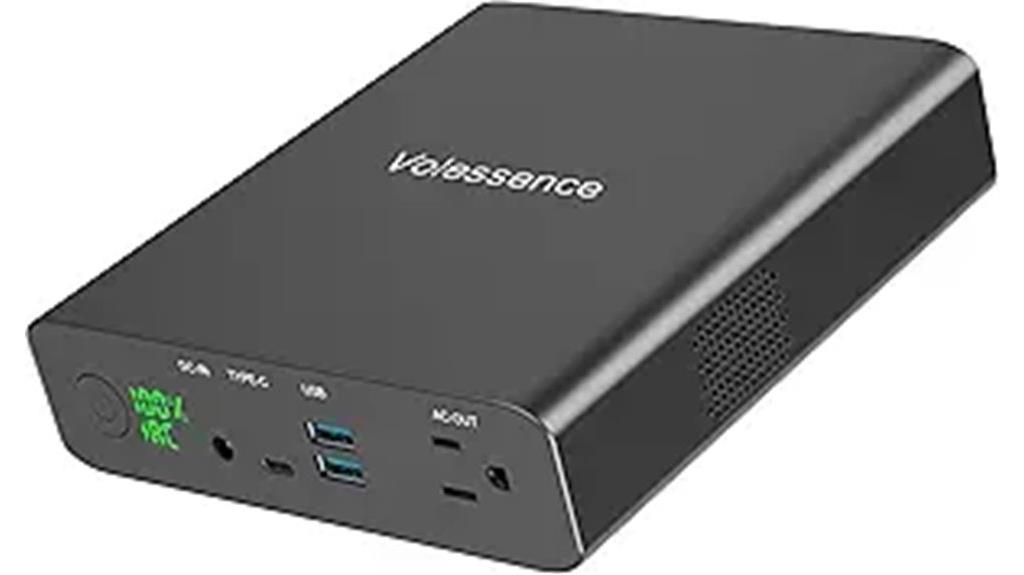
If you need a reliable portable power solution for medical devices during flights, this 27000mAh Portable Laptop Charger with AC Outlet is an excellent choice. TSA-approved and compact at 6.5 x 5.9 x 1.6 inches, it fits easily into your bag without adding much weight—just 2.6 pounds. It offers a 130W AC outlet compatible with laptops, printers, fans, and other devices under 130W. With multiple charging ports, including USB and USB-C, you can power up to four devices simultaneously. Recharging takes about 4-5 hours, and the bright LED display keeps you informed of remaining power, ensuring you’re always prepared.
Best For: travelers, outdoor enthusiasts, and professionals needing reliable portable power for multiple devices during flights, camping, or business trips.
Pros:
- TSA-approved and compact design makes it easy to carry on airplanes and outdoor activities.
- High capacity (27000mAh/99.9Wh) supports charging multiple devices simultaneously.
- Multiple ports including Quick Charge USB and USB-C for versatile device compatibility.
Cons:
- Relatively heavy at 2.6 pounds, which may be noticeable during extended travel.
- Recharging time of 4-5 hours may be longer than smaller power banks.
- Limited to devices under 130W, so not suitable for high-power appliances.
iWALK Magnetic Power Bank 10000mAh Wireless Portable Charger

The iWALK Magnetic Power Bank 10,000mAh stands out as an ideal choice for medical professionals and patients who need reliable, portable power on the go. Its 30W wireless charging and fast USB-C input/output support quick, efficient recharges—up to 40% faster than competitors. The Qi2 15W certification ensures safe wireless charging for devices like iPhone 16 and Samsung Galaxy S23. Its ergonomic, slim design with a digital display makes it easy to handle and monitor battery life. With a high-capacity battery providing about 1.5 charges for a typical phone, it’s perfect for travel and daily use, making it a dependable, all-in-one portable power source.
Best For: medical professionals, travelers, and anyone needing reliable, portable wireless charging on the go.
Pros:
- Supports 30W PD fast charging for rapid power replenishment
- Qi2 15W certified wireless charging ensures safe and efficient device charging
- Slim, ergonomic design with digital LED display for easy handling and monitoring
Cons:
- Limited to approximately 1.5 full charges for larger phones like the iPhone 15 Pro Max
- Weighs 11.7 ounces, which may be slightly heavy for ultra-light travel needs
- Requires compatible devices with wireless charging capability to maximize benefits
EASYLONGER CPAP Battery for Travel and Camping

Travelers and outdoor enthusiasts seeking a reliable power source for their CPAP devices will appreciate the EASYLONGER ES270 Battery’s TSA approval and compact design. Measuring just 5.1×2.9×1.9 inches and weighing only 1.3 pounds, it’s simple to pack for travel, camping, or emergencies. Compatible with popular devices like ResMed AirMini and Philips DreamStation, it offers around 8 hours of sleep support with humidification off. The battery supports fast charging for laptops and has a wireless charging pad for smartphones. Its digital display and built-in protections guarantee safe, hassle-free use, making it a versatile choice for on-the-go sleep therapy.
Best For: travelers, campers, and outdoor enthusiasts who need a TSA-approved, portable power source for low-power CPAP devices during travel or outdoor activities.
Pros:
- Compact, lightweight design (1.3 pounds) for easy portability.
- Compatible with popular CPAP models like ResMed AirMini and Philips DreamStation.
- Supports fast charging of laptops and includes a wireless charging pad for smartphones.
Cons:
- Primarily suitable for low-power CPAP machines; high-power devices require turning off humidification to extend runtime.
- Full charging takes around 2 hours, which may be lengthy if time is limited.
- The battery’s runtime (~8 hours) depends on device settings, so actual performance may vary.
Zopec Explore Mini CPAP Battery UPS Backup

When selecting a reliable battery backup for CPAP therapy on the go, the Zopec Explore Mini stands out due to its ultra-lightweight design and FAA compliance. Weighing just 1 pound and measuring 6.5 x 3 x 1 inches, it’s perfect for travel, camping, and RV trips. It supports all devices through patented multi-voltage tech, automatically adapting to various PAP machines like ResMed and Dreamstation. With up to 2 nights of runtime and a quick 1.5-hour recharge, it’s efficient and portable. Plus, it doubles as a fast charger for phones and tablets, making it a versatile travel companion for your CPAP needs.
Best For: travelers, campers, and RV enthusiasts seeking a lightweight, FAA-compliant backup power solution for CPAP therapy.
Pros:
- Ultra-lightweight at just 1 pound, making it highly portable for travel.
- Supports all devices via patented multi-voltage technology, ensuring compatibility.
- Provides up to 2 nights of runtime with fast 1.5-hour recharging, ideal for extended trips.
Cons:
- Additional cables required for some PAP devices are sold separately.
- Limited runtime if using multiple devices simultaneously, requiring linking batteries for extended use.
- May be less suitable for users needing very long-term power without multiple battery units.
BLUETTI CPAP Battery Backup X30 297Wh Power Supply

For those seeking reliable backup power for their CPAP or BiPAP devices during emergencies or outdoor adventures, the BLUETTI CPAP Battery Backup X30 297Wh stands out as an excellent choice. It offers 297Wh of backup capacity, supporting most popular devices like ResMed and Philips DreamStation for 5-7 nights during power outages. Its compact, lightweight design (just 3.9 lbs) and built-in handle make it easy to carry. With three DC ports and a USB-A port, it powers various devices simultaneously. Plus, it includes all necessary cables and safety features, ensuring dependable, portable power when you need it most.
Best For: individuals seeking reliable portable backup power for CPAP/BiPAP devices during emergencies, outdoor adventures, or power outages.
Pros:
- Provides 297Wh of backup capacity, supporting most CPAP/BiPAP devices for 5-7 nights.
- Compact, lightweight design (3.9 lbs) with built-in handle for easy portability.
- Includes multiple ports (DC and USB-A) and comprehensive cables for versatile device charging.
Cons:
- Limited to 297Wh, which may not be sufficient for extended or high-power device use.
- Only supports specific voltage and current outputs, potentially limiting compatibility with some devices.
- No built-in solar charging capability, requiring AC or DC input for recharging.
Factors to Consider When Choosing Airline-Approved Battery Packs for Medical Devices

When selecting an airline-approved battery pack for your medical device, I always consider the capacity limits and verify it meets airline regulations. It’s also essential to check device compatibility, runtime needs, and how portable the pack is for travel convenience. These factors help me choose a reliable, compliant power solution that fits my specific medical and travel requirements.
Battery Capacity Limits
Choosing the right battery capacity is crucial to guarantee your medical device meets airline safety rules without unnecessary hassle. Most airlines restrict carry-on batteries for medical devices to 100Wh to 160Wh. Batteries over 160Wh usually need airline approval and special packing arrangements before travel. Many portable CPAP batteries are designed with capacities around 99Wh to 160Wh to stay within these limits. Battery capacity, measured in watt-hours (Wh), is calculated by multiplying the voltage (V) by the ampere-hours (Ah). To avoid complications, selecting a battery just below 160Wh helps ensure compliance and reduces restrictions. This way, you can travel confidently without risking delays or extra approvals, making your journey smoother and more predictable.
Airline Regulations Compliance
Selecting an airline-approved battery pack involves understanding specific regulations that guarantee safety and compliance. These regulations typically specify that batteries must be lithium-ion or lithium-polymer and fall within size and capacity limits—generally under 100Wh or 160Wh for portable devices. Passengers are required to carry these batteries in carry-on luggage because most airlines prohibit spare batteries in checked baggage due to fire risks. Agencies like the FAA and IATA set strict guidelines, often requiring airline approval for batteries over 100Wh. Batteries between 100Wh and 160Wh may need special documentation or restrictions. Proper labeling and certification demonstrating adherence to safety standards are essential for smooth security checks and airline approval, ensuring safe and compliant travel with medical device batteries.
Device Compatibility Needs
Ensuring your battery pack is compatible with your medical device is essential for safe and reliable operation during travel. First, verify that the battery’s voltage and connector type match your device’s specifications to prevent operational issues. It’s also important to confirm the battery supports your device’s power needs, including any additional features like humidifiers or heated tubes. Check that the battery is FAA and TSA approved for air travel, ensuring compliance with airline regulations. Additionally, consider the capacity and runtime of the battery pack to guarantee it can power your device throughout your journey or in emergency situations. Taking these compatibility factors into account helps you choose a battery pack that’s safe, effective, and travel-ready.
Runtime Requirements
To keep your medical device operational throughout your journey, it’s crucial to determine the right battery capacity in watt-hours (Wh) based on your device’s power consumption and desired runtime. First, evaluate your device’s average power draw in watts (W). Divide the needed runtime in hours by this figure to find the required capacity. Remember, using features like humidifiers or heated tubing can reduce runtime, so factor in extra margin. Verify the battery’s capacity complies with airline regulations, typically limited to 100Wh to 160Wh for carry-on. Also, consider the battery’s efficiency and discharge rate, as these influence actual operational time beyond simple calculations. Properly assessing these factors ensures your device stays powered without exceeding airline restrictions.
Portability and Size
When choosing an airline-approved battery pack for your medical device, size and weight are key considerations that directly impact your travel experience. A compact, lightweight design guarantees you stay within airline carry-on limits while maintaining ease of use. Ideally, the battery should be small enough to fit comfortably in a pocket or carry-on bag, typically under 100Wh for safety standards. Dimensions around 5 inches by 3 inches are perfect for handling and storage, minimizing bulk alongside your other travel essentials. Slim, flat profiles help reduce weight and space, making the battery unobtrusive. An ergonomic, low-profile shape enhances portability without sacrificing power capacity, so you can travel confidently knowing your device will stay powered without adding unnecessary bulk.
Recharging Options
Choosing the right recharging options for your airline-approved battery pack can make all the difference in maintaining reliable power on the go. I look for packs that support fast recharging methods like Power Delivery (PD) USB-C chargers, which can fully recharge in just a couple of hours. It’s also important to have multiple recharging options—AC wall adapters, car chargers, and even solar panels—to stay flexible in different environments. I check that the battery’s capacity and input specs match my recharging equipment to ensure safe, efficient charging. Smart charging features are a plus, preventing overcharging or overheating during recharges. Additionally, pass-through charging allows me to recharge the battery while powering my device, keeping everything operational without interruption.
Safety Certifications
Ever wondered what safety certifications truly matter when selecting airline-approved battery packs for medical devices? It’s essential to look for batteries with FAA and TSA approval, ensuring they meet airline regulations and are safe for air travel. Additionally, verify that the device has relevant safety certifications like UL, CE, or IEC, which confirm adherence to international safety standards. Built-in safety features such as overcharge, over-discharge, short-circuit, and thermal protections are critical to prevent accidents during operation. Capacity also matters; it should comply with airline weight restrictions, typically under 100Wh. Finally, proper labeling and documentation indicating certification and safety compliance are essential, giving you confidence that the battery pack is both safe and compliant for travel with medical devices.
Price and Warranty
Price and warranty are essential factors to take into account because they directly impact your long-term investment in an airline-approved battery pack. I recommend guaranteeing the battery pack is FAA and TSA approved to avoid travel issues. When comparing options, look for at least a one-year warranty to cover manufacturing defects. Higher-capacity batteries with longer warranties often cost more upfront but can save money over time by reducing repair or replacement costs. It’s imperative to verify if the warranty covers battery replacement, repairs, or troubleshooting to ensure dependable performance. Clear warranty terms and accessible customer support are necessary for quick resolution if issues arise. Balancing cost, features, and warranty coverage helps you select a reliable, cost-effective option for your medical device needs during travel.
Frequently Asked Questions
What Safety Certifications Ensure Airline Approval for Medical Device Batteries?
I always check that medical device batteries have certifications like UN 38.3, IEC 62133, and FAA approval. These guarantee the batteries meet strict safety standards for air travel, including proper packaging, safe chemistry, and durability. When flying with medical devices, I make sure these certifications are clearly displayed. They give me confidence that the batteries are safe, reliable, and approved for airline transport, preventing any potential issues during travel.
How Long Do Airline-Approved Battery Packs Typically Last During Travel?
Think of airline-approved battery packs as reliable companions on your journey—they typically last the entire travel day, around 8 to 12 hours. This duration depends on the device’s power needs and usage. I’ve found these batteries are designed for consistency, so you can confidently rely on them without fearing sudden power loss. Just remember to check the specifications to match your device’s energy demands for smooth sailing.
Are There Size or Weight Restrictions for Medical Battery Packs on Airlines?
Yes, there are size and weight restrictions for medical battery packs on airlines. I make sure my packs fit within the TSA guidelines, typically under 100 watt-hours for carry-on, and I carry documentation if needed. I always check with my airline beforehand, as some might have specific rules. Keeping my battery pack lightweight and compact ensures smoother security checks and less hassle during my travels.
Can Airline-Approved Batteries Be Used for Multiple Medical Devices Simultaneously?
Yes, airline-approved batteries can often power multiple medical devices at once, but you should verify the battery’s capacity and airline regulations first. I recommend confirming the device’s power requirements and ensuring the combined usage doesn’t exceed the battery’s limits. Always carry documentation proving the batteries’ compliance, and notify airline staff before flying. This way, you stay compliant and ensure your medical devices run smoothly throughout your journey.
What Maintenance Is Required to Keep Battery Packs Compliant With Airline Regulations?
Did you know that over 85% of airline-approved batteries require regular inspections? To stay compliant, I make sure to check for any signs of damage or swelling before flights. I also keep documentation of maintenance and ensure batteries are stored properly in their designated cases. Regularly updating the manufacturer’s guidelines helps me stay current with changing regulations, so I can travel confidently with my medical devices.
Conclusion
As I pack my airline-approved battery for my medical device, I can’t help but imagine it as a trusted companion, quietly powering my journey through busy airports and quiet nights under starlit skies. Just like the perfect travel partner, it’s there when I need it most, ensuring peace of mind. When choosing yours, think of it as a small but essential part of your adventure — reliable, ready, and always by your side.
